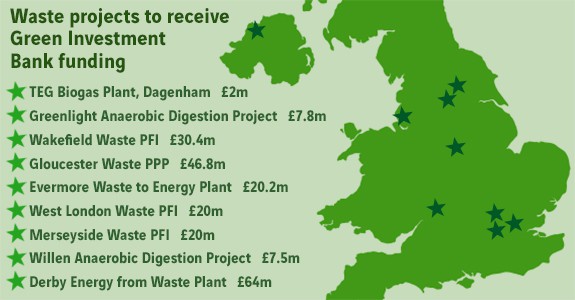The government’s Green Investment Bank (GIB) has been sold to the global banking firm Macquarie Group in a deal worth close to £2.3 billion, the Climate Change and Industry Minister Nick Hurd confirmed today (20 April).
GIB, which is wholly-owned by government was set up in 2012 to provide matched funding for renewable energy projects.

Climate Change and Industry Minister Nick Hurd
Since its inception the GIB has helped to mobilise more than £10 billion of investment into over 70 projects covering offshore wind, energy efficiency and waste and bio energy, the government has said. This has included around £1.5 billion in backing from the government itself, as well as further investment from private sector partners.
Funding
Originally headed by Adrian Judge and now under the stewardship of former investment banker Chris Holmes – GIB’s waste and bio-energy team has funded a series projects in the sector, primarily energy-from-waste and anaerobic digestion.
The Bank committed to investments in the waste sector totalling £200 million in its first two years of existence including £64 million backing for Shanks’ energy from waste plant at Sinfin in Derbyshire, as well as £20 million investment in the West London Waste PFI project.
More recent investments have included £35 million of senior debt for Wheelabrator’s proposed Parc Adfer energy from waste plant in North Wales, £80 million for DS Smith’s Kemsley CHP energy from waste plant and £28 million of debt finance package for FCC’s Millerhill energy from waste plant near Edinburgh.
The sale of the Bank to the private sector had been described as crucial by government in order to “maximise investment into green energy projects by attracting greater private sector investment.” GIB had been “constrained by rules governing how public bodies can raise capital” it was claimed.
Waste and bioenergy will remain a core investment area for the GIB following the takeover, Macquarie has suggested.
Capital
Announcing the sale today, Mr Hurd, said: “The Green Investment Bank has been very successful in attracting private capital to the UK’s green economy. It now makes sense to move it into the private sector where it will be free from the constraints of public sector ownership, allowing it to build further on its success.

An artist’s impression of the Midlothian EfW plant, which is among the projects to have been backed through GIB funding
“This deal gives us the best of both worlds. We have secured fair value for the UK taxpayer. GIB has a well-funded new owner that is committed to the Bank’s green mission, with a track record of success in green investment and an ambition to grow the business. The UK will benefit from increased investment in our green infrastructure as we make the transition to a green economy.”
Government has said that Macquarie has a track recorded of investing into green energy projects globally, with more than £8.5 billion of capital having been invested in projects in offshore wind, solar, waste and bioenergy and tidal energy by the group since 2010.
David Fass, chief executive of the Macquarie Group, said: ”The addition of the Green Investment Bank, its people and expertise, strengthens Macquarie’s commitment to the green energy sector. Our combined platform will build on the legacy of the Green Investment Bank and, alongside our knowledge of energy and infrastructure, will open further opportunities in low carbon investment both in the UK and further afield.“

Some of the waste projects to have received backing from the GIB
However, the Environmental Audit Committee has criticised the sale, pointing to a ‘lack of transparency in the transaction. In a statement, the MPs select committee, said: ““he Green Investment Bank is a unique institution, and the largest green energy investor in Europe. The Government have decided to sell it off without transparency or consideration of the alternatives. Macquarie executives and Government Ministers need to give concrete guarantees about the Bank’s future and the capital investments it will make.”
Nick Molho, executive director of the Aldersgate Group – an environmental consortium of businesses and politicians called for continued support for green infrastructure projects. He said: “Now that the GIB has been fully privatised and the UK can expect to receive less funding from the European Investment Bank post Brexit, the government must ensure that it has a clear strategy in place to attract private finance to deliver its environmental and low carbon policy objectives.
“Projects involving new technologies and business models will be required to deliver the UK’s Clean Growth Plan and 25 Year Environment Plan.”
The post Green Investment Bank sold to Macquarie for £2.3bn appeared first on letsrecycle.com.
Source: letsrecycle.com Waste Managment


